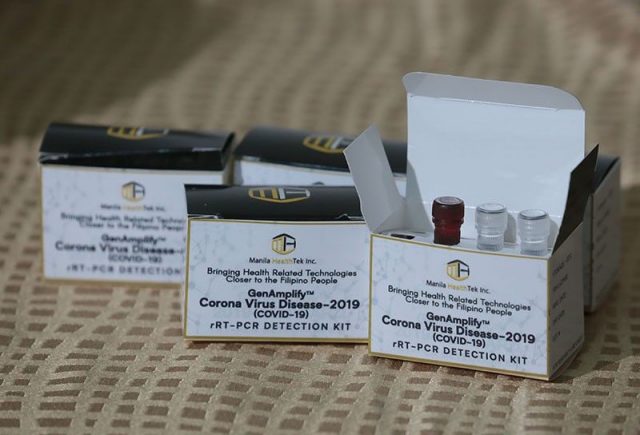
Several concerned members of the social sector and some officials are calling on the Department of Health to conduct a large-scale testing of suspected cases of the novel coronavirus in the country.
This, after the World Health Organization called on all countries to ramp up their testing programs to fight the pandemic.
“All countries should be able to test all suspected cases, they cannot fight this pandemic blindfolded,” WHO Director General Tedros Adhanom Ghebreyesus said last week.
When asked of the possible implementation of mass testing, the DOH said that the measure is still not yet needed but assured the public that the Philippines can do it.
“’Di natin kailangang gawin itong mass testing na ito [sa ngayon]. Kung sakaling dumating ang panahon (But in case that time comes), we have enough resources. The government can do it,” DOH Spokesperson Maria Rosario Vergeire told reporters in a recent press briefing.
The calls for mass testing in the Philippines also came after politicians and their families including President Rodrigo Duterte were reported to undergo COVID-19 testing amid lack of detection kits.
READ: A closer look at DOH’s triage system and why politicians, officials are getting tested for COVID-19
Most of the government officials who underwent testing were asymptomatic, which refers to having no symptoms of the illness. They cited possible exposure to an infected person from their recent travels as their main reason for getting tested.
Screenshots of supposed chat messages from a health professional at the Research Institute for Tropical Medicine (RITM) showing alleged priority list for detection which included names of prominent politicians have also been making rounds across Facebook and Twitter.
RITM houses the country’s lone testing center for COVID-19 in Muntinlupa City.
READ CAREFULLY:
VIPs (politicians) were
(1) PRIORITIZED THAN PUIs and PUMs;
(2) given a SPECIAL CODE to designate as URGENT [less than 24 hrs] and;
(3) asymptomatic when tested
(source: RITM professional) https://t.co/8dZIs9rifM pic.twitter.com/Ivk5HvU6ib
— No Chill Millennial ✨🙃✊ (@darnitJC) March 22, 2020
In view of this, the hashtags #MassTestingNowPH and #NotoVIPtesting had been trending on local Twitter since Sunday while #MassTestingNgayonNa also landed on the top trending topics in protest of the VIP testing. As of writing, the hashtags have more than 75,500 tweets, 96,700 tweets, 5,800 tweets, respectively.
On Monday afternoon, the DOH issued a statement assuring the public “that there is no policy for VIP treatment and that all specimens are being processed on a first-in, first-out basis.
“Criteria for testing all patients follows published screening protocols,” it said.
“With courtesy accorded to officials holding positions of national security and public health,” the health agency also said.
DOH ANNOUNCEMENT
23 March 2020
3:00 PM pic.twitter.com/NxBwrzZX4o— Department of Health (@DOHgovph) March 23, 2020
How Philippines can achieve ‘mass testing’
Meanwhile, concerned parties who are calling for mass testing took to social media to share steps on how this can be conducted in the country and how it can curb the spread of the new pathogen.
- Increase the country’s testing capacity.
An alliance of scientists, health experts, as well as 336 organizations in the Philippines called Scientists Unite against COVID-19 urged the government in a petition last March 20 to augment the testing kits produced by the UP-NIH and the foreign kits for donation.
𝗪𝗲 𝗮𝗿𝗲 𝗮𝗻 𝗮𝗹𝗹𝗶𝗮𝗻𝗰𝗲 𝗼𝗳 𝗰𝗼𝗻𝗰𝗲𝗿𝗻𝗲𝗱 𝘀𝗰𝗶𝗲𝗻𝘁𝗶𝘀𝘁𝘀, 𝗼𝗿𝗴𝗮𝗻𝗶𝘇𝗮𝘁𝗶𝗼𝗻𝘀, 𝗮𝗻𝗱 𝗼𝘁𝗵𝗲𝗿 𝗰𝗶𝘁𝗶𝘇𝗲𝗻𝘀, 𝘄𝗵𝗼 𝗮𝗿𝗲 𝗰𝗮𝗹𝗹𝗶𝗻𝗴 𝗼𝗻 𝘁𝗵𝗲 𝗣𝗵𝗶𝗹𝗶𝗽𝗽𝗶𝗻𝗲…
Posted by Scientists Unite Against Covid-19 on Friday, March 20, 2020
Concerning the kits from other countries, the group asked the country’s Food and Drug Administration to waive or expedite their regulatory requirements, therefore, speeding up the process of making them available to local testing centers.
Aside from kits, they’re also working out a database of laboratories with the necessary equipment for COVID-19 detection.
However, all additional testing labs and centers, should be accredited first.
“A bottleneck here is the need for DOH accreditation of testing labs. Again, we call on DOH to waive or expedite regulatory requirements, or at least allow for provisional testing to begin pending formal accreditation,” the group of scientists said.
This petition has so far gathered more than 2,000 signatories.
- Train for additional manpower.
The alliance is also building another database of health experts composed of molecular biologists, medical technicians and other scientists trained for COVID-19 testing.
This is to provide manpower to the RITM, the primary body authorized to conduct the detection of the new disease.
A Facebook page called Mass Testing Now PH similarly recommended that some military, police and security personnel be properly trained and equipped conduct tests.
This page also created an online petition via Change.org last March 16. It has since gathered 136,890 signatures out of 150,000 as of press time.
“Provide immediate comprehensive medical training for the military, police, and security forces. Maintain civilian leadership by appointing a trained health worker to lead every checkpoint and security team,” part of the statement read.
- Provide protective equipment.
The group also expressed the need for more supply of health workers’ medical equipment such as personal protective equipment or PPEs.
“Secure necessary medical equipment needed by our health workers and hospitals such as face masks, gloves, ventilators, personal protective equipment (PPE), and oxygen tanks. Engage the private hospitals to share their medical equipment, PPE, and facilities,” the group Mass Testing Now PH said.
Robredo shared in a post that her office provided PPEs and over P5.3 million worth of extraction kits, which will help get samples for approximately 12,750 tests.
She enumerated the names of the hospitals where these kits can be availed on her post.
[A] TULONG PARA SA TESTING KITS, IPINAABOT NG TANGGAPAN NI VP LENI!Kahapon ay naghatid ng tulong ang Tanggapan ni VP…
Posted by VP Leni Robredo on Thursday, March 19, 2020
- Test health workers and front liners, all individuals with symptoms and communities with confirmed cases.
With additional equipment and manpower in place, all individuals with symptoms of the disease, as well as communities with confirmed cases should then be tested.
Renato Reyes Jr., former secretary-general of Bayan Muna, emphasized this via an infographic he shared on social media.
“When we say Mass Testing Now, we mean testing of patients with COVID -19 symptoms, frontline health workers, and communities with confirmed cases,” Reyes said.
When we say #MassTestingNowPH, we mean testing of patients with COVID 19 symptoms, frontline health workers, and communities with confirmed cases. #NOtoVIPTesting of politicians which only delay test results of patients who are dying. pic.twitter.com/tnARcsW7jy
— Renato Reyes, Jr. (@natoreyes) March 22, 2020
Sen. Risa Hontiveros, likewise, sought for mass testing “to protect health workers, frontliners and those at risk.”
Nagkakasakit na yung mga health workers at frontliners natin. Pero kahit sila hindi natetest dahil sa current triage.
Mass testing will protect our healthworkers, frontliners, & those who are at-risk.
Mass testing will save more lives.#MassTestingNgayonNa
— risa hontiveros (@risahontiveros) March 23, 2020
On the other hand, Sen. Sherwin Gatchalian said he has been working to secure test kits and processing hospitals for Valenzuela City, where he previously led as mayor.
“I strongly urge all LGUs to avail of the accredited test kits for their constituents,” the senator said.









